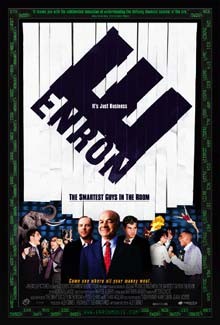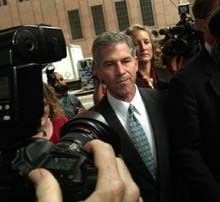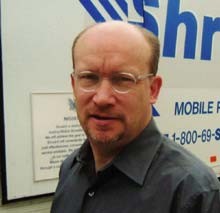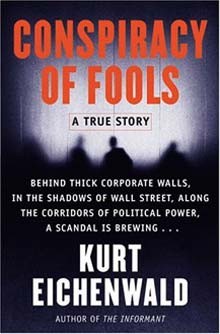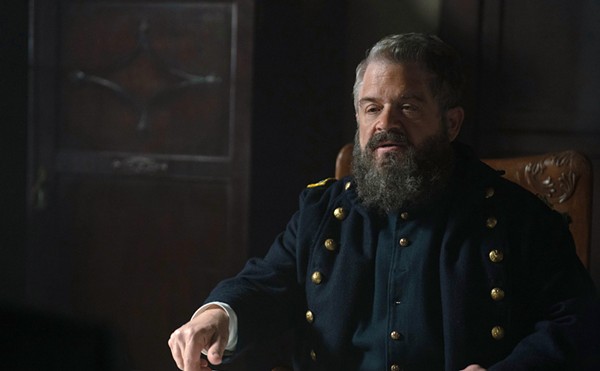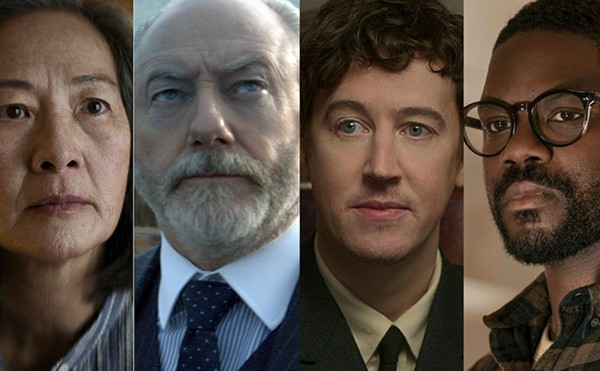'The Smartest Guys in the Room' documents the avarice that led to Enron's downfall
| |
So, no matter what your experience is with the subject matter, the name Enron is sure to provoke some emotion even for those who only recognize the corporate moniker from episode No. 298 of The Simpsons, in which a rollercoaster amply tagged "Enron's Ride of Broken Dreams" is ridden into the ground by some of the cartoon characters.
| |
| |
| Muggers' shots: Former Enron executives (from top) Andrew Fastow, Ken Lay, and Jeffrey Skilling, have spent the past four years haunted by the actions that led to the Houston-based energy company's collapse in 2001. Filmmaker Alex Gibney (bottom) explores their decisions and the nature of greed in his documentary, Enron: The Smartest Guys in the Room, based on the book of the same name. |
"`Enron` is a very complicated story," Gibney told the Current in March during the South By Southwest Film Festival. "The toughest part was to be able to boil it down so that people could understand it. I think a lot of people were aware that something bad happened at Enron, but most people didn't know what had happened."
Gibney transforms headline names such as Ken Lay, Jeff Skilling, Cliff Baxter, and Andy Fastow into living, breathing prevaricators, and business terms such as "mark-to-market accounting" - a method that allows companies to report estimated value on a contract, instead of actual cash receipts, as a profit - into household dialect for even the most novice of stock-market players.
"It was important to me to be clear enough about what happened in the financial scandal," Gibney said. "The Enron story at the end of the day is not really a story about numbers or special purpose entities. It's a story about people. And that is what ultimately pulls the film together."
Gibney was inspired to document the roots of greed in American culture after reading the The Smartest Guys in the Room: The Amazing Rise and Scandalous Fall of Enron by Fortune magazine reporters Bethany McLean and Peter Elkind. He said he was determined to discover what it takes for someone to deceive others for their own benefit. "It was such a powerful human drama. It's a dramatic story about people and how they went wrong."
Although Gibney says he believes that Enron's executives did not sketch out their business plan with fraud in mind, through his intense research for the film he could see Lay and Skilling, the lead antagonists of the Enron debacle, "looking for whatever loopholes they could find and taking advantage" of the system.
| "The system is based on greed. The key is, what is the balance? Every business is designed to make as much money as possible but the question then is, is that what it should all be about or does business have to have values?" - Alex Gibney |
"It was a progressive process," Gibney explained, calling Lay and Skilling's dealings "economic terrorism." "They created this financial illusion that got worse and worse and worse. So when a harsh light was cast onto it, the whole thing came crashing down."
Gibney views contemporary corporate America as a "cutthroat" business that is built on the ideals of self-indulgence. Although he says the "kill or be killed" ideology is the backbone of many corporations, it's not a surefire way to end up like the Enron corporation.
"The system is based on greed," Gibney said. "The key is, what is the balance? Every business is designed to make as much money as possible but the question then is, is that what it should all be about or does business have to have values? Does business need to worry about its employees or just its executives? These are key questions in what kind of society we are going to make. In Enron, they set up a system where if you trampled over people you got hugely rewarded. They took greed further than anybody else had ever taken it." •
Some shit flows uphill
By Sean-Paul Kelley
'Conspiracy of Fools' argues that Fastow's superiors ignored his mismanagement until it became a criminal matter
| |
There were some convincing stories amidst the Internet triumphalism, such as Applied Materials and Dell, but one story always seemed too good to be true. A stock whose numbers just couldn't be real; the margins of their businesses couldn't possibly support their annual growth projections.
That company was Enron.
Now, Kurt Eichenwald does for accountants what John Grisham did for lawyers: He makes their work fascinating, thrilling. Greed, power, deceit, stupidity, indifference, and hubris are all on display in Conspiracy of Fools, the sad, sorry, and true drama of Enron's bankruptcy. Three characters dominate Eichenwald's narrative, as they have the news: Ken Lay, Jeffrey Skilling, and Andrew Fastow. Each contributed in their own way to Enron's demise.
The phrase "out of touch" hardly does justice to Enron Chairman Lay. To the very end, Lay believed Enron had "only" a PR problem. "`The press` they've got a hate-on for us," Lay told Enron's public-relations chief two weeks before Enron declared bankruptcy. Meanwhile, President Skilling believed bold concepts and innovative ideas were enough to run a large corporation, relegating the "details" to his subordinates.
One of those subordinates was Chief Financial Officer Fastow, who took toadying to new lows. Originally hired by Enron as a deal maker to bridge finance and trading, Fastow clung to Skilling's rise like a lamprey to a surfacing shark. His early failures hardly registered with Skilling. Promoted to finance, Fastow soon brown-nosed his way into the CFO's corner office. Here his malignant incompetence rotted the core of Enron while his management of Chewco, Jedi, and LJM I and II - special purpose entities designed to hide losses - ultimately bankrupted Enron.
Enter Skilling, a MacKinsey wonderboy who worshipped at the high church of markets. His sole contribution to Enron was a dogmatic belief that exploiting the right market would solve Enron's problems. It was Skilling's indifference towards Fastow's failures that led directly to Enron's collapse.
Nonetheless, the collapse might not have occurred if a more hands-on CEO ran the company. Trusting the day-to-day operations of Enron to his subordinates, Lay preferred politicking and PR to management. Eichenwald recounts how all of Lay's holdings were in Enron stock, which, as it began its precipitous decline, he borrowed against in order to "diversify."
Conspiracy of Fools is a page-turner. A reader might find herself in traffic wondering what turn Fastow, Lay, or Skilling will take next. Eichenwald's narrative reconstruction is that good. And the bean counters at Deloitte, KPMG, and Ernst & Young, well, I think they'll find espresso beans in this book. •

